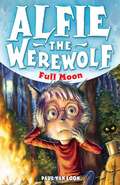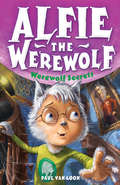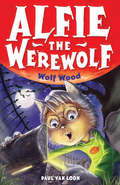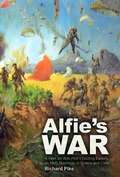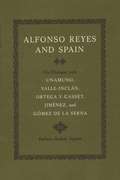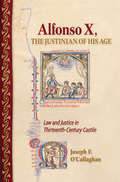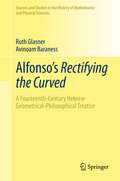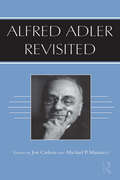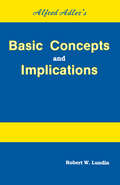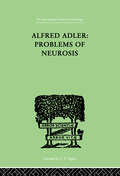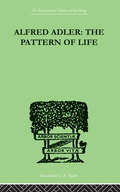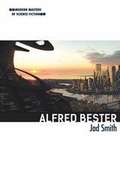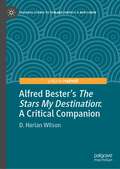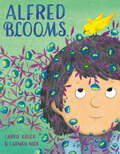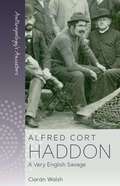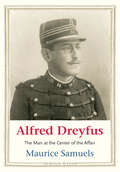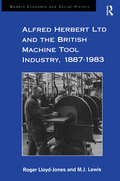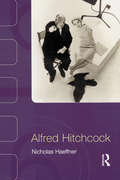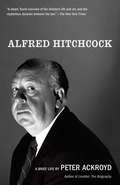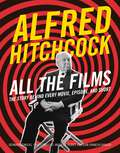- Table View
- List View
Alfie the Werewolf: Full Moon
by Paul Van LoonAlfie and Tim are looking forward to their school trip, until Tim gets flu and has to stay behind. Alfie will have to cope without his best friend for once, but at least it's not full moon and he won't be turning into a werewolf ... or so he thinks!A calendar mix-up means that Alfie will be camping out with his classmates in the woods during full moon with a crazy hunter as their guide. How on earth will Alfie keep his werewolf identity a secret from his friends and avoid being the hunter's prey? And as if that wasn't enough, something scary is lurking in the forest ...
Alfie the Werewolf: Werewolf Secrets
by Paul Van LoonAlfie and his friends are on holiday. A break from all the werewolf mysteries and spooky goings on? No chance! When Alfie discovers a creepy old house full of mysterious portraits and a family tree that features his name he has to investigate ... and what he finds is a group of orphan werewolves under the control of crazy lady Mooma. Can Alfie help them and avoid getting captured too?
Alfie the Werewolf: Wolf Wood
by Paul Van LoonWolf Wood has been home to generations of werewolves, including Grandpa Werewolf, and holds an important secret. But unscrupulous developers plan to destroy the woods and build blocks of flats and carparks. The werewolves are in danger - and so is their secret. When Alfie's mysterious dreams lead him to uncover the secret of Wolf Wood he knows he must save it - can his classmates help Alfie stop the bulldozers, before the wood gets turned into a block of flats?
Alfie's Castle: Independent Reading Blue 4 (Reading Champion #469)
by Jackie WalterWhen Alfie gets a brick castle for his birthday, he can't wait to get started building it! But Mum, Dad and Grandad all have trouble assembling their parts ... until Alfie discovers how to solve the problem. If they work as a team, they can build the best castle ever!Reading Champion offers independent reading books for children to practise and reinforce their developing reading skills.Fantastic, original stories are accompanied by engaging artwork and a reading activity. Each book has been carefully graded so that it can be matched to a child's reading ability, encouraging reading for pleasure.
Alfie's War: A Fleet Air Arm Pilot's Exciting Exploits on HMH Illustrious, and Greece and Crete
by Richard PikeThe bestselling author of Seven Seas, Nine Lives continues the remarkable experiences of Captain A.W.F. &“Alfie&” Sutton during the Second World War. Written in three parts, this book follows the harrowing adventures of Captain A.W.F. &“Alfie&” Sutton, CBE, DSC and bar, RN. During events which come as close to fiction as is imaginable, the first part describes how Alfie, badly injured and close to death during the bombing of HMS Illustrious by the Luftwaffe in January 1941, wakes to find himself laid out among the dead, but miraculously still able to help the ship on to Malta. After full recovery, part two starts with his involvement in the Allied campaign in Greece in the spring of 1941, leading to him eventually evacuating the Greek royal family in a flying boat. After numerous escapades he fights with the defenders during the German invasion of Crete in 1941. Admiral Cunningham was later to describe Sutton&’s efforts as &“an example of grand personal courage under the worst possible conditions which stands out brightly in the gloom.&” It was a struggle doomed to failure, but Alfie survived to continue his war and tell his story to author Richard Pike who relates it here with passion, pace and drama.
Alfonso Reyes and Spain
by Barbara Bockus AponteAlfonso Reyes, the great humanist and man of letters of contemporary Spanish America, began his literary career just before the outbreak of the Mexican Revolution of 1910. He spearheaded the radical shift in Mexico's cultural and philosophical orientation as a leading member of the famous "Athenaeum Generation. " The crucial years of his literary formation, however, were those he spent in Spain (1914-1924). He arrived in Madrid unknown and unsure of his future. When he left, he had achieved both professional maturity and wide acclaim as a writer. This book has, as its basis, the remarkable correspondence between Reyes and some of the leading spirits of the Spanish intellectual world, covering not only his years in Spain but also later exchanges of letters. Although Reyes always made it clear that he was a Mexican and a Spanish American, he became a full-fledged member of the closed aristocracy of Spanish literature. It was the most brilliant period in Spain's cultural history since the Golden Age, and it is richly represented here by Reyes' association with five of its most important figures: Miguel de Unamuno and Ramón del Valle-Inclán were of the great "Generation of 98"; among the younger writers were José Ortega y Gasset, essayist and philosopher; the Nobel poet Juan Ramón Jiménez; and Ramón Gómez de la Serna, a precursor of surrealism. Alfonso Reyes maintained lifelong friendships with these men, and their exchanges of letters are of a dual significance. They reveal how the years in Spain allowed Reyes to pursue his vocation independently, thereby prompting him to seek universal values. Coincidentally, they provide a unique glimpse into the inner world of those friends-and their dreams of a new Spain.
Alfonso Soriano (Superstars of Baseball)
by Tania RodriguezAlfonso Soriano has had a great career in baseball. He has won two World Series and played in the All-Star Game seven times. He's even part of the 40-40 club for hitting 40 home runs and stealing 40 bases in one season. Not many baseball players can say they've done the things that Soriano has! Learn about Soriano's path from playing baseball in the Dominican Republic to making it in the Major Leagues. Explore the life story of one of baseball's most successful players!
Alfonso X, the Justinian of His Age: Law and Justice in Thirteenth-Century Castile
by Joseph F. O'CallaghanIn this magisterial work, Joseph O'Callaghan offers a detailed account of the establishment of Alfonso X's legal code, the Libro de las leyes or Siete Partidas, and its applications in the daily life of thirteenth-century Iberia, both within and far beyond the royal courts. O'Callaghan argues that Alfonso X, el Sabio (the Wise), was the Justinian of his age, one of the truly great legal minds of human history.Alfonso X, the Justinian of His Age highlights the struggles the king faced in creating a new, coherent, inclusive, and all-embracing body of law during his reign, O'Callaghan also considers Alfonso X's own understanding of his role as king, lawgiver, and defender of the faith in order to evaluate the impact of his achievement on the administration of justice. Indeed, such was the power and authority of the Alfonsine code that it proved the king's downfall when his son invoked it to challenge his rule. Throughout this soaring legal and historical biography, O'Callaghan reminds us of the long-term impacts of Alfonso X's legal works, not just on Castilian (and later, Iberian) life, but on the administration of justice across the world.
Alfonso's Rectifying the Curved: A Fourteenth-Century Hebrew Geometrical-Philosophical Treatise (Sources and Studies in the History of Mathematics and Physical Sciences)
by Ruth Glasner Avinoam BaranessThis volume offers a new English translation, introduction, and detailed commentary on Sefer Meyasher 'Aqov, (The Rectifying of the Curved), a 14th-century Hebrew treatise on the foundation of geometry. The book is a mixture of two genres: philosophical discussion and formal, Euclidean-type geometrical writing. A central issue is the use of motion and superposition in geometry, which is analyzed in depth through dialog with earlier Arab mathematicians. The author, Alfonso, was identified by Gita Gluskina (the editor of the 1983 Russian edition) as Alfonso of Valladolid, the converted Jew Abner of Burgos. Alfonso lived in Castile, rather far from the leading cultural centers of his time, but nonetheless at the crossroad of three cultures. He was raised in the Jewish tradition and like many Sephardic Jewish intellectuals was versed in Greek-Arabic philosophy and science. He also had connections with some Christian nobles and towards the end of his life converted to Christianity. Driven by his ambition to solve the problem of the quadrature of the circle, as well as other open geometrical problems, Alfonso acquired surprisingly wide knowledge and became familiar with several episodes in Greek and Arabic geometry that historians usually consider not to have been known in the West in the fourteenth century. Sefer Meyasher 'Aqov reflects his wide and deep erudition in mathematics and philosophy, and provides new evidence on cultural transmission around the Mediterranean.
Alfred Adler Revisited
by Jon Carlson Michael P. ManiacciAlfred Adler was one of the most influential thinkers in psychotherapy – a physician, psychiatrist, author, and professor who wanted to answer the questions that plagued people during a significant time in history. His original ideas serve as a foundation for most modern theories of counseling and psychotherapy, ideas and writings that are brought back to life in this volume. Within, contemporary experts comment and introduce Adler's work through the lens of the 21st century. In doing so, they pay tribute to, analyze, and disseminate his classic, seminal papers that have significantly impacted the therapy field. The 23 papers included were chosen because of their relevance to today's issues, and their importance in Adlerian theory and practice. They detail the core elements of his theory, the tactics he used to advocate change in individuals and systems, and emphasize how contemporary his ideas are. Alfred Adler Revisited not only plays homage to a great professional, it revives his ideas and encourages debate over fundamental human issues.
Alfred Adler's Basic Concepts And Implications
by Robert W. LundinFirst published in 1989. Routledge is an imprint of Taylor & Francis, an informa company.
Alfred Adler: A Book of Case-Histories (International Library Of Psychology Ser.)
by Mairet, PhilippeFirst Published in 1999. Routledge is an imprint of Taylor & Francis, an informa company.
Alfred Adler: The Pattern of Life
by W. Beran WolfeFirst Published in 1999. Routledge is an imprint of Taylor & Francis, an informa company.
Alfred Bester
by Jad SmithAlfred Bester's classic short stories and the canonical novel The Stars My Destination made him a science fiction legend. Fans and scholars praise him as a genre-bending pioneer and cyberpunk forefather. Writers like Neil Gaiman and William Gibson celebrate his prophetic vision and stylistic innovations. Jad Smith traces the career of the unlikeliest of SF icons. Winner of the first Hugo Award for The Demolished Man , Bester also worked in comics, radio, and TV, and his intermittent SF writing led some critics to brand him a dabbler. In the 1960s, however, New Wave writers championed his work, and his reputation grew. Smith follows Bester's journey from consummate outsider to an artist venerated for foundational works that influenced the New Wave and cyberpunk revolutions. He also explores the little-known roots of a wayward journey fueled by curiosity, disappointment with the SF mainstream, and an artist's determination to go his own way.
Alfred Bester’s The Stars My Destination: A Critical Companion (Palgrave Science Fiction and Fantasy: A New Canon)
by D. Harlan WilsonIn this comprehensive study of The Stars My Destination, D. Harlan Wilson makes a case for the continued significance of Alfred Bester’s SF masterwork, exploring its distinctive style, influences, intertextuality, affect, and innovation as well as its extensive metafictional properties. In Stars, Bester established himself as a son of the pulp-SF and high-modernist writers that preceded him and a forefather to the New Wave and cyberpunk movements that followed his lead. Wilson’s study depicts Bester as an SF insider as much as an outlier, writing in the spirit of the genre but breaking with the fixation on hard science in favor of psychological interiority, literary experimentation, and adult themes. The book combines close-readings of the novel with broader concerns about contemporary media, technoculture, and the current state of SF itself. In Wilson’s view, SF is a moribund artform, and Stars foresaw the inevitable science fictionalization of our benighted world. With scholarly lucidity and precision, Wilson shows us that Stars pointed the way to what we have (un)become.
Alfred Blooms
by Carrie KruckShy Alfred wants to befriend the girl whose yard is filled with other kids and flowers but he doesn't know how. When Alfred sees Lulu&’s magical yard filled with flowers and friends, he&’s sure that if he can cultivate a beautiful garden, friends will flock to join him. Alfred tries but nothing grows in his brown patch of dirt. Determined to make one last attempt, Alfred heads to the store to buy fresh flower seeds. As he hurries home, he sneezes—and the seeds fly everywhere! And this time they begin to grow wherever they land—in his pockets, in his hair, even in his ears! A very discouraged Alfred gets stuck in the mud. But the aroma of warm blueberry muffins coming from a nearby bakery reminds him of Lulu&’s favorite treat and, tucking the flowers under his hat, he heads there. Alfred shares muffins with Lulu and finds out that he doesn&’t need a garden; time spent together is the best way to make a friend. This charming friendship story is sensitive and delightful with just a touch of whimsy.
Alfred C. Kinsey: A Life
by James H. JonesThe hidden life of Alfred C. Kinsey, the principal architect of the sexual revolution. In this brilliant, groundbreaking biography, twenty years in the making, James H. Jones presents a moving and even shocking portrait of the man who pierced the veil of reticence surrounding human sexuality. Jones shows that the public image Alfred Kinsey cultivated of disinterested biologist was in fact a carefully crafted public persona. By any measure he was an extraordinary man--and a man with secrets. Drawing upon never before disclosed facts about Kinsey's childhood, Jones traces the roots of Kinsey's scholarly interest in human sexuality to his tortured upbringing. Between the sexual tensions of the culture and Kinsey's devoutly religious family, Jones depicts Kinsey emerging from childhood with psychological trauma but determined to rescue humanity from the emotional and sexual repression he had suffered. New facts about his marriage, family life, and relationships with students and colleagues enrich this portrait of the complicated, troubled man who transformed the state of public discourse on human sexuality.
Alfred Cort Haddon: A Very English Savage (Anthropology's Ancestors #5)
by Ciarán WalshAn innovative account of one of the least-understood characters in the history of anthropology. Using previously overlooked, primary sources Ciarán Walsh argues that Haddon, the grandson of anti-slavery activists, set out to revolutionize anthropology in the 1890s in association with a network of anarcho-utopian activists and philosophers. He regards most of what has been written about Haddon in the past as a form of disciplinary folklore shaped by a theory of scientific revolutions. The main action takes place in Ireland, where Haddon adopted the persona of a very English savage in a new form of performed photo-ethnography that constituted a singularly modernist achievement in anthropology. From the Introduction: Alfred Cort Haddon was written out of the story of anthropology for the same reasons that make him interesting today. He was passionately committed to the protection of simpler societies and their civilisations from colonists and their supporters in parliament and the armed forces.
Alfred Dreyfus: The Man at the Center of the Affair (Jewish Lives)
by Maurice SamuelsAn insightful new biography of the central figure in the Dreyfus Affair, focused on the man himself and based on newly accessible documents On January 5, 1895, Captain Alfred Dreyfus&’s cries of innocence were drowned out by a mob shouting &“Death to Judas!&” In this book, Maurice Samuels gives readers new insight into Dreyfus himself—the man at the center of the affair. He tells the story of Dreyfus&’s early life in Paris, his promising career as a French officer, the false accusation leading to his imprisonment on Devil&’s Island, the fight to prove his innocence that divided the French nation, and his life of quiet obscurity after World War I. Samuels&’s striking perspective is enriched by a newly available archive of more than three thousand documents and objects donated by the Dreyfus family. Unlike many historians, Samuels argues that Dreyfus was not an &“assimilated&” Jew. Rather, he epitomized a new model of Jewish identity made possible by the French Revolution, when France became the first European nation to grant Jews full legal equality. This book analyzes Dreyfus&’s complex relationship to Judaism and to antisemitism over the course of his life—a story that, as global antisemitism rises, echoes still. It also shows the profound effect of the Dreyfus Affair on the lives of Jews around the world.
Alfred Herbert Ltd and the British Machine Tool Industry, 1887-1983 (Modern Economic and Social History)
by Roger Lloyd-Jones M.J. LewisAt the beginning of the twentieth century Britain was amongst the world leaders in the production of machine tools, yet by the 1980s the industry was in terminal decline. Focusing on the example of Britain's largest machine tool maker, Alfred Herbert Ltd of Coventry, this study charts the wider fortunes of this vital part of the manufacturing sector. Taking a chronological approach, the book explores how during the late nineteenth century the industry developed a reputation for excellence throughout the world, before the challenges of two world wars necessitated drastic changes and reorganisations. Despite meeting these challenges and emerging with confidence into the post-war market place, the British machine tool industry never regained its pre-eminent position, and increasingly lost ground to foreign competition. By using the example of Alfred Herbert Ltd to illuminate the broader economic and business history of the British machine tool industry, this study not only provides a valuable insight into British manufacturing, but also contributes to the ongoing debates surrounding Britain's alleged decline as a manufacturing nation.
Alfred Hitchcock
by Nicholas HaeffnerNicholas Haeffner provides a comprehensive introduction to Alfred Hitchcock's major British and Hollywood films and usefully navigates the reader through a wealth of critical commentaries. One of the acknowledged giants of film, Hitchcock's prolific half-century career spanned the silent and sound eras and resulted in 53 films of which Rear Window (1954), Vertigo (1958) and Psycho (1960) are now seen as classics within the suspense, melodrama and horror genres. In contrast to previous works, which have attempted to get inside Hitchcock's mind and psychoanalyse his films, this book takes a more materialist stance. As Haeffner makes clear, Hitchcock was simultaneously a professional film maker working as part of a team in the film factories of Hollywood, a media celebrity, and an aspiring artist gifted with considerable entrepreneurial flair for marketing himself and his films. The book makes a case for locating the director's remarkable body of work within traditions of highbrow, middlebrow and lowbrow culture, appealing to different audience constituencies in a calculated strategy. The book upholds the case for taking Hitchcock's work seriously and challenges his popular reputation as a misogynist through detailed analyses of his most controversial films.
Alfred Hitchcock
by Peter AckroydA gripping short biography of the extraordinary Alfred Hitchock, the master of suspense. Alfred Hitchcock was a strange child. Fat, lonely, burning with fear and ambition, his childhood was an isolated one, scented with fish from his father's shop. Afraid to leave his bedroom, he would plan great voyages, using railway timetables to plot an exact imaginary route across Europe. So how did this fearful figure become the one of the most respected film directors of the twentieth century? As an adult, Hitch rigorously controlled the press's portrait of him, drawing certain carefully selected childhood anecdotes into full focus and blurring all others out. In this quick-witted portrait, Ackroyd reveals something more: a lugubriously jolly man fond of practical jokes, who smashes a once-used tea cup every morning to remind himself of the frailty of life. Iconic film stars make cameo appearances, just as Hitch did in his own films: Grace Kelly, Cary Grant, and James Stewart despair of his detached directing style and, perhaps most famously of all, Tippi Hedren endures cuts and bruises from a real-life fearsome flock of birds. Alfred Hitchcock wrests the director's chair back from the master of control and discovers what lurks just out of sight, in the corner of the shot.
Alfred Hitchcock All the Films: The Story Behind Every Movie, Episode, and Short
by Bernard Benoliel Gilles Esposito Murielle Joudet Jean-François RaugerOrganized chronologically and covering every short film, television episode, and classic film that the "Master of Suspense" directed over the course of his illustrious, 60-year career, Alfred Hitchcock All the Films draws upon years of research to tell the behind the scenes stories of how each project was conceived, cast, and produced, down to the creation of the costumes, the search for perfect locations, and of course, the direction of some of cinema's most memorable scenes. Spanning more than six decades, and including stories of work with longtime collaborators like costume designer Edith Head, title designer Saul Bass, and composer Bernard Herrmann, this book details the creative processes that resulted in numerous classic films like Vertigo,The Birds,Psycho, Rear Window, North By Northwest,andTo Catch a Thief (to name a few). The director's classic TV series are also covered extensively along with original release dates, lesser-known short films, box office totals, surreptitious casting details, and other insider scoops that will keep fans and students alike turning pages. Alfred Hitchcock All the Films is the perfect book for the movie fan in your life.
Alfred Hitchcock Presents: Stories That Scared Even Me
by Alfred Hitchcock17 short stories by a variety of authors, the novelette It by Theodore Sturgeon, and the novel Out of the Deeps by John Wyndham.
